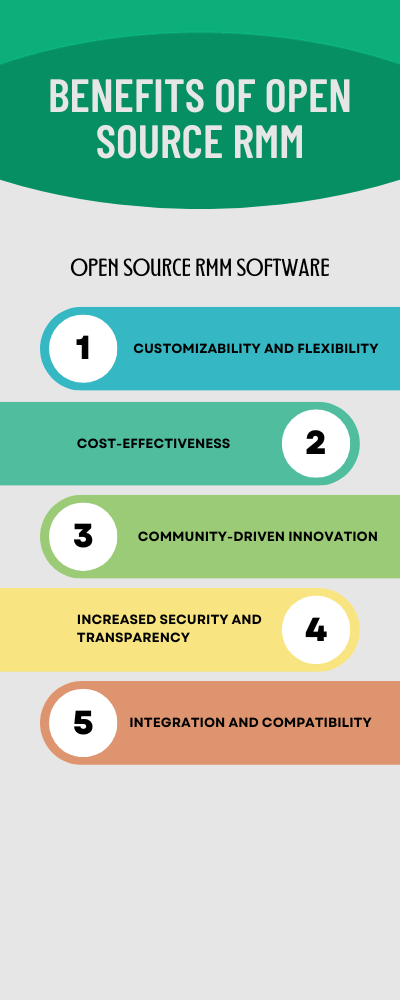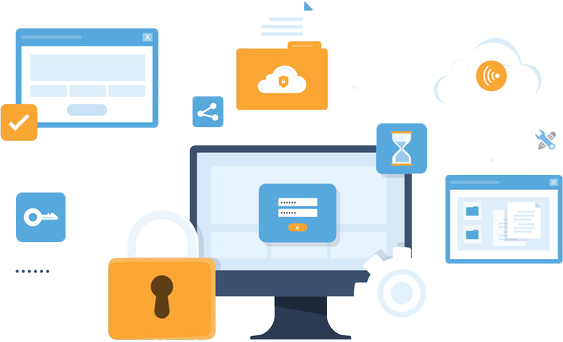What is Open Source RMM?
Remote Monitoring and Management (RMM) is a fundamental concept in the world of IT management, essential for ensuring the smooth operation and security of computer networks. In particular, Open Source RMM represents a transformative approach in this field, combining the flexibility and adaptability of open-source software with the robust capabilities of traditional RMM systems.
The Essence of Open Source RMM
Open Source RMM software is built on the principles of open-source licensing, meaning its source code is freely available for anyone to view, modify, and distribute. This transparency fosters a collaborative environment where developers from around the globe contribute to the software's evolution, ensuring it stays at the forefront of technological advancements and security practices. Unlike proprietary RMM solutions, open-source RMM offers a more customizable and flexible option for IT professionals.
Key Features and Benefits
- Customizability and Flexibility: One of the most significant advantages of Open Source RMM is its high degree of customizability. IT teams can tailor the software to fit their specific needs, adding or modifying features as required. This flexibility is particularly beneficial for businesses with unique IT infrastructures or those needing specialized monitoring and management capabilities.
- Cost-Effectiveness: Open Source RMM often comes with reduced or no licensing fees, making it a cost-effective solution for businesses of all sizes. This aspect can be particularly appealing for small to medium-sized enterprises (SMEs) or startups looking to optimize their IT budgets.
- Community-Driven Innovation: The open-source nature of these RMM tools means they benefit from the collective input and innovation of a global community of developers. This collaborative effort often leads to quicker identification and patching of vulnerabilities, more frequent updates, and a wider range of features compared to some proprietary solutions.
- Increased Security and Transparency: With its open-source code, users can audit the software themselves for security vulnerabilities, an option not typically available with proprietary software. This transparency builds trust and allows for more robust security measures to be implemented.
- Integration and Compatibility: Open Source RMM software is generally designed with compatibility in mind, allowing for seamless integration with a wide range of systems and applications. This interoperability is crucial for complex IT environments that utilize a diverse mix of hardware and software.
Challenges and Considerations
While Open Source RMM offers numerous benefits, it also comes with its own set of challenges. The need for specialized knowledge to customize and maintain these systems can be a hurdle for some organizations. Furthermore, the reliance on community support as opposed to dedicated customer service teams from a proprietary vendor can be a concern, particularly for critical issues.

The Future of Open Source RMM
The future of Open Source RMM looks promising, with continuous advancements driven by evolving IT needs and the growing community of open-source developers. As businesses increasingly recognize the value of flexible and cost-effective IT solutions, Open Source RMM is poised to become a more prevalent choice in the industry.
Why Choose ITarian?
When it comes to selecting an Open Source RMM platform, ITarian stands out as a top contender. With its advanced features, commitment to innovation, and user-centric approach, ITarian offers a unique blend of benefits tailored to meet the diverse needs of today's businesses. Here's why choosing ITarian for your RMM needs is a wise decision:
- Advanced Technology and Innovation
ITarian's Open Source RMM solution is at the forefront of technological advancement. The platform is constantly evolving, incorporating the latest trends and technologies in IT management. This commitment to innovation ensures that users always have access to cutting-edge tools and features that can significantly enhance their IT management capabilities.
- Customization and Flexibility
One of the core strengths of ITarian's RMM software is its high degree of customization. Understanding that no two businesses are the same, ITarian allows users to tailor the software to their specific needs. Whether it's customizing dashboards, setting unique alert parameters, or integrating with other tools, ITarian's platform offers the flexibility required to create a personalized IT management experience.
- User-Friendly Interface
Despite its robust capabilities, ITarian's RMM platform is designed with user-friendliness in mind. The intuitive interface makes it easy for users, regardless of their technical expertise, to navigate and utilize the platform effectively. This ease of use ensures that businesses can quickly onboard their teams and start benefiting from the software without a steep learning curve.
- Comprehensive Support and Community
Choosing ITarian means gaining access to a comprehensive support system. Although the software is open-source, ITarian provides robust support to its users, including detailed documentation, user forums, and access to a team of experts. This support is invaluable for businesses that require prompt and reliable assistance for their IT management needs.
- Cost-Effective Solutions
Cost efficiency is a key consideration for any business, and ITarian addresses this by offering an Open Source RMM solution that minimizes the total cost of ownership. The platform's pricing structure is transparent and competitive, making it an attractive option for businesses looking to optimize their IT spending.
- Enhanced Security and Compliance
With cybersecurity threats on the rise, ITarian places a strong emphasis on security. The RMM platform includes robust security features designed to protect networks and data effectively. Moreover, ITarian is committed to compliance with industry standards, ensuring that businesses using its software can meet their regulatory requirements with ease.
- Scalability for Growth
As businesses grow, their IT needs evolve. ITarian's RMM platform is built with scalability in mind, allowing businesses to expand their IT management capabilities as needed. This scalability ensures that ITarian remains a suitable solution for businesses of all sizes, from small startups to large enterprises.
Open Source RMM FAQ
Answer: Open Source RMM (Remote Monitoring and Management) is a type of software tool used for remotely managing and monitoring IT infrastructure, such as servers, computers, and network devices. The 'open source' aspect means that its source code is freely available for anyone to use, modify, and distribute. This openness leads to enhanced customizability, community-driven improvements, and often, a more cost-effective solution compared to proprietary RMM software.
Answer: The primary difference lies in the software's licensing and development model. Traditional RMM solutions are typically proprietary, developed and maintained by a single company, with users paying for licenses. In contrast, Open Source RMM is developed collaboratively by a community of developers, and its source code is freely accessible. This leads to a more customizable and flexible system, with potential cost savings due to the lack of licensing fees. However, it may require more technical expertise to implement and manage compared to some proprietary solutions.
Answer: The benefits of Open Source RMM include cost-effectiveness, customization, community-driven innovation, and increased security due to its transparency. Users can tailor the system to their specific needs and benefit from the collective knowledge and advancements of the open-source community. The challenges can include a steeper learning curve, the need for more technical expertise to manage and customize the software, and potentially less structured support compared to proprietary RMM solutions. Businesses must weigh these factors based on their resources and IT management requirements.
